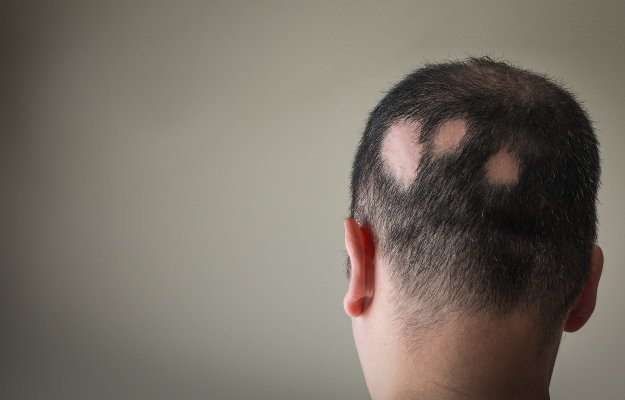
Hormone Health TRT

 Distinct from Alopecia Areata, telogen effluvium affects hair growth differently. Whereas alopecia causes clumps or patches of hair to fall out, telogen effluvium usually leads to a more evenly diffused hair loss. While it may happen mostly on top or mostly in the back, the loss of hair will be much more evenly distributed. While this leads to fewer glaring bald patches, it can also make telogen effluvium harder to notice, often delaying diagnosis.
So what causes telogen effluvium and how can you avoid it? Simply put: avoid stresses to the body which is often easier said than done. For example, childbirth is an often-reported (and often inevitable) initial cause of TE. Traumatic events like an automobile crash or the death of a loved one can also bring about episodes of TE. These events tend to be unexpected and wholly unmanageable as a source of stress.
If you are experiencing TE while taking an antidepressant drug, speak with a doctor. This is often resolved by switching to a different antidepressant drug therapy.
When seeking treatment for TE, your doctor will help diagnose the causal factor that brought about TE in your case. If it is stress, the resolution will be to remove the source of stress or find ways to manage your outlook toward the stress-inducer. For those instances in which a dietary deficiency is the cause, your doctor may recommend dietary supplements or a lifestyle change. Or if you’ve had a recent event like a surgery or childbirth, your best treatment might be to wait a few months – many cases resolve in this way within a year.
If you have questions about hair loss, connecting with a doctor in a discrete setting has never been easier.
Telehealth is a new resource for men. Opt Health exists to help men address discrete health questions on their terms.
Opt Health is a telemedicine platform that reconnects men with wellness, fitness, strength, and sexual vitality through scientific preventive medicine. From your own home, you can schedule with a physician, meet one-on-one via video conference, receive test results, and have medications delivered to your door.
For questions, inquiries, or appointments, don’t hesitate to contact us. Get personalized support and insight from top-tier physicians available 24/7.
Distinct from Alopecia Areata, telogen effluvium affects hair growth differently. Whereas alopecia causes clumps or patches of hair to fall out, telogen effluvium usually leads to a more evenly diffused hair loss. While it may happen mostly on top or mostly in the back, the loss of hair will be much more evenly distributed. While this leads to fewer glaring bald patches, it can also make telogen effluvium harder to notice, often delaying diagnosis.
So what causes telogen effluvium and how can you avoid it? Simply put: avoid stresses to the body which is often easier said than done. For example, childbirth is an often-reported (and often inevitable) initial cause of TE. Traumatic events like an automobile crash or the death of a loved one can also bring about episodes of TE. These events tend to be unexpected and wholly unmanageable as a source of stress.
If you are experiencing TE while taking an antidepressant drug, speak with a doctor. This is often resolved by switching to a different antidepressant drug therapy.
When seeking treatment for TE, your doctor will help diagnose the causal factor that brought about TE in your case. If it is stress, the resolution will be to remove the source of stress or find ways to manage your outlook toward the stress-inducer. For those instances in which a dietary deficiency is the cause, your doctor may recommend dietary supplements or a lifestyle change. Or if you’ve had a recent event like a surgery or childbirth, your best treatment might be to wait a few months – many cases resolve in this way within a year.
If you have questions about hair loss, connecting with a doctor in a discrete setting has never been easier.
Telehealth is a new resource for men. Opt Health exists to help men address discrete health questions on their terms.
Opt Health is a telemedicine platform that reconnects men with wellness, fitness, strength, and sexual vitality through scientific preventive medicine. From your own home, you can schedule with a physician, meet one-on-one via video conference, receive test results, and have medications delivered to your door.
For questions, inquiries, or appointments, don’t hesitate to contact us. Get personalized support and insight from top-tier physicians available 24/7.
Your health, your terms. Discover how personalized care can transform not just the way you feel, but how you live.